The following interview with Abdaljawad Omar was recorded on September 25, 2024, before the massive Israeli attack on the Dahiya neighborhood of Beirut which killed Hezbollah Secretary General Hasan Nasrallah. In the interview Omar outlines Israel’s overall strategy in its escalation with Hezbollah, which is consistent with its assassination of Nasrallah, and how it is connected to the ongoing genocide in Gaza.
The following transcript has been edited for conciseness and clarity. The full version of the conversation is available on The Mondoweiss Podcast.
Mondoweiss: Israel has been waging a brutal bombing campaign on Lebanon. At the time of recording, over 700 Lebanese have been killed. This comes almost a week after the Lebanese pager attack where hundreds of personal electronic devices were booby-trapped by Israel and exploded across the country, killing and wounding thousands of people. How do you read the situation in Lebanon?
Abdaljawad Omar: For at least two weeks, we’ve been seeing Israel moving upwards in the escalation ladder in its northern borders, specifically with the Lebanese resistance and more specifically with Hezbollah. It has conducted various forms of operations using some of its intelligence gathered in the 17 years since the 2006 war, including knowledge of Hezbollah. It’s able to penetrate some of its communication devices to create what is called, in military language, a “system shock” in enemy forces.
To do that, it showed its capability of blowing up the pagers and then blowing up some of the walkie-talkies that members of the Lebanese resistance use. Of course, it’s important to note that a lot of these pagers and walkie-talkies are also used by civilians and the wider Lebanese social base from which Hezbollah is drawn, which is why there were a lot of civilian casualties when these devices exploded in homes, markets, and other locations. It was described as a terror attack because it did not really differentiate between military personnel and civilians in Lebanon more broadly.
After conducting these two massive attacks that attempted to paralyze Hezbollah, it also continued with its approach of assassinating its leadership, including bombing a meeting that was taking place between some of Hezbollah’s leaders in Dahiya in Beirut. About a dozen of those leaders were killed, including one of the main commanders of the Hezbollah military forces.
From a military standpoint, these attacks were meant, first of all, to exact a price from Hezbollah. They’re a step up in the escalation ladder, and they were meant to create this system shock by weakening Hezbollah’s confidence in itself as a fighting force, creating mistrust in its own communication networks, and depriving it of some of its key leaders.
Then, after it conducted all of these forms of attack, Israel also moved to a widescale bombing campaign, one of the highest and most intensive bombing campaigns that the Israeli Air Force has ever conducted in its history. It’s targeting Lebanese homes across villages in the south, and now even in the north and in the Beqaa Valley and other areas across Lebanon.
But despite the operational success — even Hasan Nasrallah, the Secretary General of Hezbollah, has acknowledged that these were painful attacks on Hezbollah — the current paradigm does not mean that these operational successes will translate easily into strategic success. The rationale behind this intensifying escalation campaign is to try to decouple the Lebanese or northern Palestine front from the ongoing genocidal war in the Gaza Strip.
Thus far we have seen that Hezbollah has remained calm, and has been able to also control the escalation of its rocket firepower, whether in terms of what areas it actually targets inside historic Palestine (for now, it has limited itself mostly to the northern part of historical Palestine, the Galilee area), or by using some of its more high-quality precision rockets. It has slowly and steadily increased the tempo of attacks in a very measured manner, which shows that Hezbollah has maintained command and control, has maintained its ability to fight, still has a lot of its capability intact, and has not used most of its capabilities throughout this military campaign.
So what we have now is a trading of blows. Of course, within this paradigm, Israel is committing more atrocities, killing more civilians, and targeting more of the civic space in Lebanon, while Hezbollah is largely confining itself to military targets, whether it’s military bases or some of the industrial infrastructure around Israel’s military system and its military capability.
You pointed out that Hezbollah’s response has been relatively calm and measured compared to Israel’s bombing campaign, which is the bloodiest since 2006. In your opinion, how much of Israel’s attacks on Hezbollah and Lebanon is to provoke Hezbollah into a greater response, and to accelerate this regional war that Netanyahu seems really keen on having?
Well, I think from the outset, Israel has been looking for a highly intensive and short form of warfare. It does not want this war to continue with Hezbollah endlessly, meaning that it’s pursuing a coercion policy. By intensifying its campaign and getting Hezbollah to also intensify its firepower, it can reach a point where each actor would want to resolve issues quite quickly and, therefore, reach a strategic stalemate that would actually enable a diplomatic resolution to happen without Gaza being considered.
I think what Hezbollah has been attempting to do is to show that it’s capable of swallowing up a lot of Israel’s attacks. Some of them were surprising and shocking, but Hezbollah has still continued in its policy of attritional warfare without reaching the threshold of complete war.
So Israel is still in a bind. On one hand, the advantage of being in Israel’s position is that it can test Hezbollah’s limits: it can bomb as much as it wants, kill as many people as it wants, exact a price from Hezbollah’s social base and its military organizational capacity, and still not get into total war. But at the same time, Israel is also, at some level, afraid of getting dragged into all-out war, as it would cause a lot of havoc within Israel itself, especially if Hezbollah uses its entire rocket arsenal and targets strategic infrastructure or some of its more advanced economic infrastructure in the north or the center.
Since Hezbollah has been able to maintain a measured response so far, it is thwarting Israel’s strategic objective of decoupling Lebanon from Palestine.
We’ve seen Israel’s rhetoric regarding Lebanon and Hezbollah has been very similar to what it has been saying about Gaza. They make no difference between Lebanese people and Hezbollah fighters, claiming weapons are being stored in civilian homes, telling people to flee before civilian areas are bombed. How much of the Gaza genocidal playbook are you seeing playing out in Lebanon?
I think what’s important to understand is not the playbook itself, which replicates a similar rhetorical or discursive stance, but how this characteristic of Israeli fighting has come about. Israel is an army that practices a “post-heroic” form of warfare, relying heavily on standoff firepower — mainly airpower. It does not want to risk its soldiers. To the extent possible, it wants to unleash its firepower while preserving its military forces and capacity to fight over time, without sacrificing many of its soldiers.
We have seen this in Gaza. Yes, of course, Israel wants to change the paradigm of the relationship with the Palestinians and is committing genocide and ethnic cleansing to ensure that the idea of October 7, as a moment of possibility for liberation in the Middle East and in the world more broadly, is killed through this monstrous policy. But Israel is also incapable of fighting a war where its soldiers are placed in high-risk situations. It cannot sustain a campaign where its soldiers will actually enter homes or areas where they would find these weapons.
Of course, a lot of these claims that Israel has been throwing around can’t actually be confirmed. There was no highly complex military command center under al-Shifa Hospital in Gaza, for instance. Israel has not shown any proof that placing rockets in civilian homes is happening in any significant way to justify such widescale aerial bombardment. So we can’t take these claims with any seriousness. A lot of them are just made to justify targeting what it sees as an important base for resistance movements — the civilian or social space from which the resistance emerges.
By exacting a bloody price, Israel hopes this society will pressure resistance movements to give up on the fight.
Israel’s rogue behavior in Gaza, and what we’re seeing right now in Lebanon, wouldn’t be possible without the U.S.’s unconditional support for Israel. Many experts have called the U.S. approach a disastrous failure of policy. In what ways has the U.S. failed to de-escalate the situation or hold Israel accountable both in Gaza and Lebanon?
Well, one of the things here is that nobody really knows what the Americans want. Do they want to just contain the war while allowing it to continue endlessly? Do they want to give Israel more maneuvering space to exact a price from Hezbollah, Hamas, and all these different groups challenging Israel? Or do they want to end the war?
It’s difficult to distill a consistent policy from the Americans. On the one hand, they claim that they want a ceasefire, but they hold the keys to stopping the war by stopping the flow of arms.
Without this endless flow of arms, Israel would have a hard time fighting a war on these multiple fronts and using its airpower in this way. America has a lot of leverage, unlike what it says. It says it’s incapable of actually stopping the war, which is factually and objectively untrue.
I think that America, at some level, sees Israel’s willingness to continue fighting could play to its advantage as long as it does not harm its vital interests in the Middle East or lead to all-out war regionally. So if the war widens to Lebanon but remains confined to it, and if Israel is able to weaken these resistance groups at the same time, America can just simply attempt to manage the war and prevent its expansion to the wider region. That’s one way of thinking about it.
The second way of thinking about it is that America is actually supporting an Israeli policy of slowly escalating to the point of even confronting Iran, Iraq, or Syria. They’re thinking, Israel has moved from Gaza and was able to come back with some results in terms of depriving the resistance of some of its capabilities, so perhaps it should emulate the same scenario in Lebanon and then move to other areas. Perhaps it could even seek a military solution with Iran or, at the very least, weaken it.
As long as this war continues, the possibilities exist for both scenarios. There should be no certainty in our thinking about war. War in itself provides many opportunities, but as actors practice their power, they might grow more or less confident. By becoming more confident, they could make many mistakes in assessment. And if they get less confident, they might retreat at a time when they shouldn’t. These things in war are highly unpredictable.
Over the past two weeks, Israel has gained some confidence in its military capabilities. It could take these military successes as a sign of its ability to decisively defeat all of these forces. Maybe it will make mistakes along the way and actually pay a heavier price by misreading the nature of its success.
So I think that it remains uncertain what American policy is, but what we can say for certain is that there is no real will to end the war in Gaza or Lebanon.
Now, I’ve heard you saying this isn’t currently a full-out war. What would, in your eyes, need to happen for it to be labeled as such? And how can things even get to a level of de-escalation?
When we talk about all-out war, when it comes to Lebanon, it would include a ground maneuver by Israeli forces into the southern Lebanese towns, or wherever else they would reach. Both parties would use more of their capabilities. Even with this brutal bombing campaign in Lebanon, Israel still has not targeted a lot of the civilian infrastructure in Lebanon itself, and it has not targeted Beirut extensively.
Of course, it could change at any moment that we could see that Israel is bombing Beirut more extensively and Hezbollah is bombing Tel Aviv more extensively or using more of its firepower and its rockets. But at this moment, this is just the next level of a more intense campaign. Again, I think that Hezbollah is trying as much as possible to keep this war measured. Playing it out in the long term while Israel is trying as much as possible to use the intensity of its abilities in order to pressure Hezbollah into a corner to agree to decouple from the war in Gaza, Hezbollah’s attempt, or the Lebanese resistance’s more broadly, is attempting to stop the genocide in Gaza.
Now, having said that I think that the problem of defining the type of war we’re in is a hallmark of this hybrid form of warfare. It’s not a war between two equally equipped forces or regular armies. This is a war between resistance forces that use a mix of tactics and operational abilities and an established state. Each has its own alliance system, its own investment in military capabilities, and weapons systems. It’s a blend of low intensity, high intensity, medium intensity, and maybe also the ability to move between these intensities at various points.
Each actor is thinking of how to economize its use of weapons and extract as many political gains from this war as possible. At the same time, there is also a fear that an all-out war will be costly for everyone. A broader regional war means a lot of bad news for the global economy. It’s bad news for anyone in American politics running for elections. It’s bad news for inflation. It’s bad news for people’s pockets in everyday life in New York, Pennsylvania, or London.
So there’s a lot of fear around an all-out war, but at the same time, we’re still playing within a specific set of give-and-take between these forces and what they can actually produce in terms of costs on the other. And I think this will continue. There’s an escalation ladder that I don’t think is exhausted by just one step or another step. There are a lot of steps before we get into a more open war with everybody using whatever they have in their capabilities against the other.
Israel is still carrying out a genocide in Gaza and recently closed down Al Jazeera’s office inside the West Bank. With global attention now focused on Lebanon, do you see Israel’s actions being even more heinous in Gaza and the West Bank?
I mean, sometimes when the attention is directed on one specific front, Israel might get away with doing things in another context. During the war on Gaza, for instance, the settlers and the settler-led government of Israel used that opportunity to annex more land, build more settlements, organize and take over Palestinian homes, and unleash the killing machine in the West Bank, but in a more managed manner than in Gaza (at least until now).
The war with Lebanon at this specific moment does direct the attention rightfully towards Lebanon. Because of the intense aerial bombardment, the potential for all-out war and the repercussions on Lebanon and its people is a very difficult and painful moment for a lot of people, including us in Palestine. We look at the horror that is happening in Lebanon and feel for every person who’s sacrificing in support of Palestine. But having said that, I think that at this current moment, while Israel is conducting a lot of its military operations in the north, it’s already overextended in many ways militarily, and will need to divert a lot of resources in order to fight a highly complex war.
Hezbollah is not the same as Hamas in terms of types of weapons, strategic depth, and alliance systems. Israel will have to divert a lot of resources to fight it, and it cannot risk things escalating in the West Bank in ways that would extend it even more. On a military level, I don’t think Israel will be very aggressive in the West Bank. It will continue to make its presence felt, specifically in the north of the West Bank, conducting operations and making people feel that they’re still on top of things, but they’ll try not to have the West Bank blow up in their faces while they’re still fighting in Lebanon.
Could you talk a little bit about how the internal political situation in Israel, including Netanyahu’s leadership and his right-wing coalition partners, influenced its military strategy in both Gaza and Lebanon? And what is your sense of the general Israeli public? Do they want a war with Lebanon?
I may be exaggerating at some level, but those are the contours of how Israel viewed October 7. Not because it was really an existential risk. We already saw that in only two or four days, Israel was able to regain the Gaza envelope and the settlements surrounding Gaza. But on the level of the psyche, that’s how it felt for most Israelis. So they want to regain the initiative. They saw October 7 as an opportunity to exact a price from everybody in the region who supports resistance. They want to destroy societies that are challenging them, whether in Gaza, Lebanon, or other places.
The real desire is for an ultimate form of victory, this kind of awe-inspiring victory that will give them an answer to their existential questions.
I think that on some level, the Israelis won the war, they won the victory. They want to create these awe-inspiring moments, like we saw with the pager and walkie-talkie attacks, which they have severely missed in contrast to how they were caught with their pants down on October 7.
October 7 was a moment that not only stuck in the Israeli psyche, but the Palestinian psyche as well. Israel’s genocide in Gaza inspired shock and horror, but didn’t inspire a lot of awe. It didn’t give Israelis the taste of power that Israeli identity was built on. But with Hezbollah, we’ve seen this awe factor come back, like the penetration of the communication devices and blowing them all up at once. This includes some of the operations that Israel has conducted in Gaza, like the extraction of some Israeli prisoners held by the Palestinian resistance.
That’s on a level of, if you want, psychological and aesthetic analysis. But on a political level, Israel finds this as an opportunity. It’s already way deep into a war for 11 months, a war that is costing it a lot economically, socially, politically, and diplomatically. It sees that only more war will bring about better results in those domains.
It will be able to establish what it calls deterrence. It will be able to put a line in the sand and say, if you ever challenge us again, this is what will happen to you. It will burn into the consciousness of the people of the region that Israel shouldn’t be played with. All of these motivations coexist all at once in Israel’s conduct—and of course, for the settlers specifically.
The only ones who have a real solution for this whole Palestinian question, instead of managing the conflict or shrinking the conflict or destroying the possibilities for two states or one state, are the settlers who say that we should change the paradigm with the Palestinians. They say, we should destroy Palestinian existence in the land of Palestine.
So for the settlers, the “ultimate victory” is to get rid of as many Palestinians as possible from the river to the sea, including Palestinian citizens of Israel, and establish the kind of pure religious Jewish state that they have always dreamed of. For them, war is desirable. It maintains the possibility for ethnic cleansing, it maintains the possibility for genocide. It means it still keeps the possibility of total victory open. Of course, even in their wildest dreams, even if they clear out all of the Palestinians from Palestine, I think the Palestinian question will not go away.
Yeah, I want to touch a little bit more on what you said about the Israeli psyche and this kind of idea of total victory. As you were talking, I was thinking about how Israel constantly leaks images of violent acts they’ve done to Palestinian prisoners, I think to obviously dehumanize Palestinians and to break our psyche. And as you put it, October 7 broke the security psyche that Israelis had about themselves and about the state of Israel. But I’m curious from your perspective, as someone in the West Bank, how has the resistance psyche for Palestinians changed and evolved since October 7?
October 7 peeled away the Iron Wall that Israel surrounds itself with. The Zionist movement has theorized this iron wall from its inception, in the writings of Ze’ev Jabotinsky, the leader of the revisionist Zionist movement in the 1920s and 30s. He wrote about this iron wall and the need for military power to be used extensively, repeatedly, until the Arabs surrendered.
There’s a kind of dialectic, if you want, between the Iron Wall and Palestinian Arab attitudes toward Israel. That Iron Wall started to dissolve after October 7.
But today, the situation among Palestinians is one of disorientation. People don’t know what the future holds. There’s a lot of anxiety and fear. And this is reinforced by a military occupation that is actually a regime of terror. It chooses who to arrest and who not to arrest, who to kill and who to leave alive, whose home to destroy, and who is spared. This is one level.
On a second level — and this is perhaps a surprising element if you want — there is the idea that liberation is not some fictional scenario in the far-off future. That idea came across on October 7. Maybe it was only possible for a couple of days. I’m not here to assess the historical veracity of whether October 7 will lead to liberation as a certainty, because I don’t believe in inevitability. I’m much more cautious about trying to make judgments on where this war will end up. And I think it already presents us with both the nightmare and the dream at the same time. And perhaps sometimes the nightmare is the dream and the dream is a nightmare. But, my only point is that when October 7 came as this possibility of liberation, people were also afraid of liberation itself, as if, at this moment, we’re not ready to think of the end of an order to which we’ve already adapted ourselves. Even though we want to end it, we have made choices in our life based on this order.
This opening of an actual horizon for liberation has, for a lot of Palestinians, meant rethinking who they are and what it means to be Palestinian. This is specifically true for people outside of Gaza because I think people within Gaza are only thinking about the immediate end of the war.
But in many ways, I think resistance still operates on this level of hope. Its existence and persistence, where Gaza is giving people hope that the war will end and that the Palestinians will come out, still with a lot of pain, but having at least prevented Israel from achieving everything that it wants to achieve. The same goes for the Lebanese resistance and other resistance movements in the region.
And we should remember, of course, that part of the social discourse around whether we’ve lost or won the war is being fed through systematic psychological warfare by a lot of Arab governments and the Israeli information warfare units. They are operating through social media and established media operations in the Arab world, feeding psychic and ideological assaults against the resistance.
I think there’s no single decisive answer to this question It just goes in different directions, because war is living in uncertainty.
Thank you for that. And finally, but before we end here, where do you see the events in Lebanon heading? Do you see de-escalation on the horizon or do you see it going out to a full-blown war?
Well, look, I’ve learned something about predictions in this war and it is that those who make them end up looking like fools. So I don’t see that the war will deescalate unless one of the actors flinches or is incapable of continuing or decides to retreat. Looking at Israeli strategy at this moment, it’s true that it wants a short intensive war, which it will not get in Lebanon, so the only option it has is to escalate more and more, forcing the Lebanese resistance to escalate as well. And unless there is some sort of intervention by Israel’s allies that is actual and tangible, I think that this war will unfortunately continue to escalate.
ABOUT THE AUTHORS
Khader Jabbar
Khader Jabbar is Mondoweiss’s Digital Director
Abdaljawad Omar
Abdaljawad Omar is a Palestinian scholar and theorist whose work focuses on the politics of resistance, decolonization, and the Palestinian struggle.

 MARTIN C. FREDRICKS IV
MARTIN C. FREDRICKS IV
 This work is licensed under a Creative Commons Attribution-NonCommercial 4.0 International License •
This work is licensed under a Creative Commons Attribution-NonCommercial 4.0 International License • 








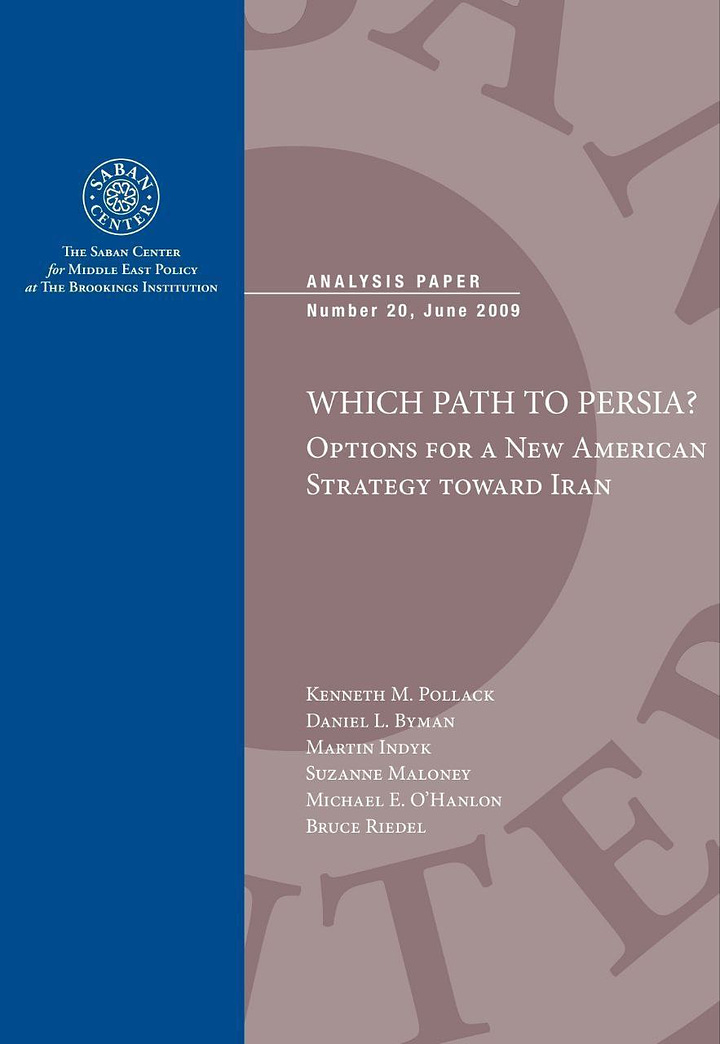
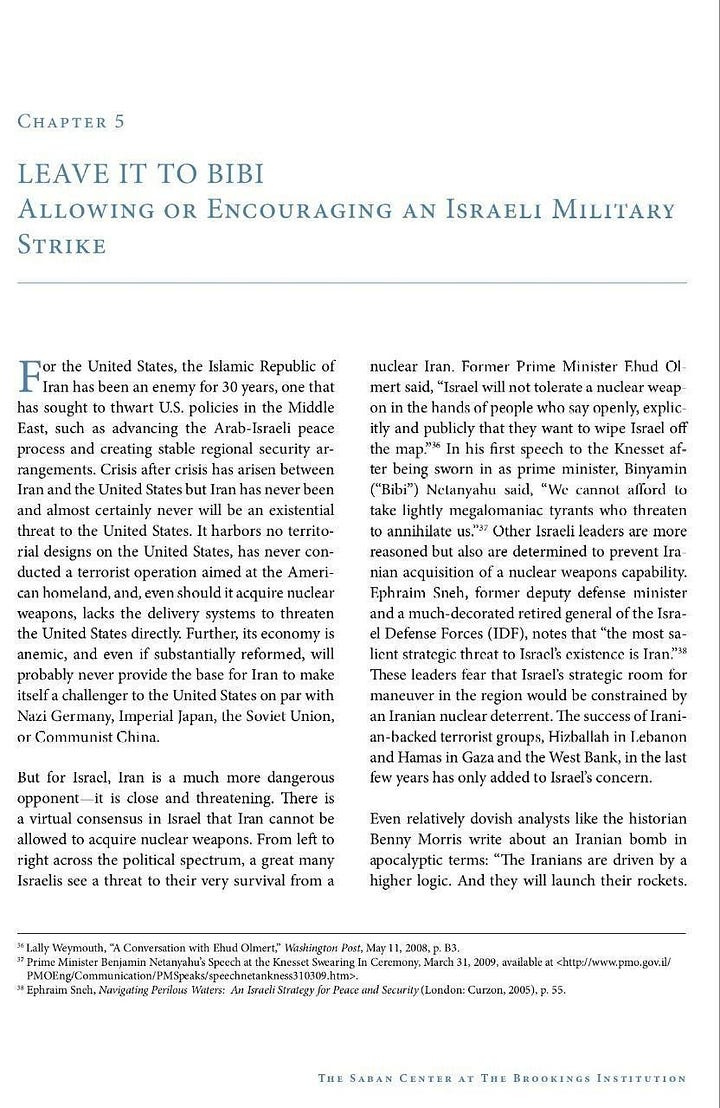
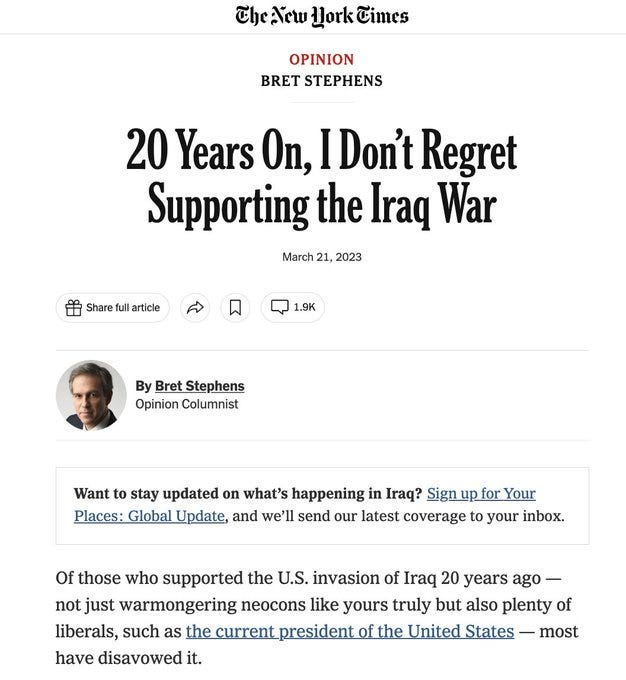
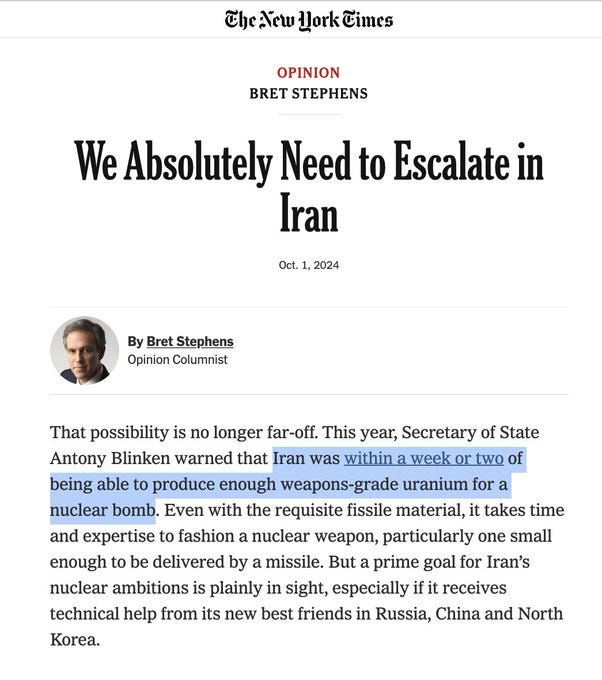

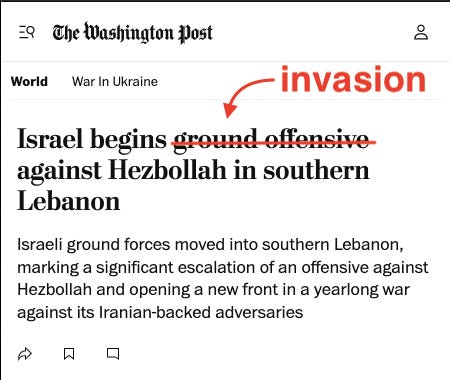
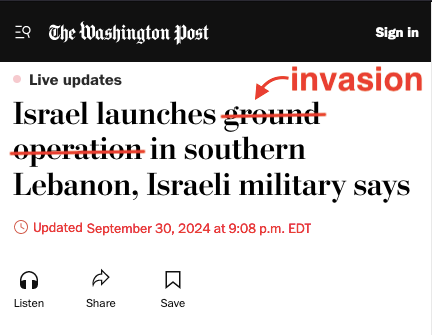
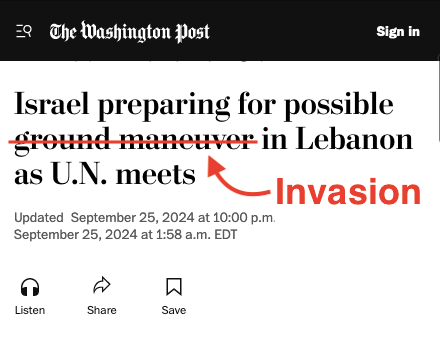
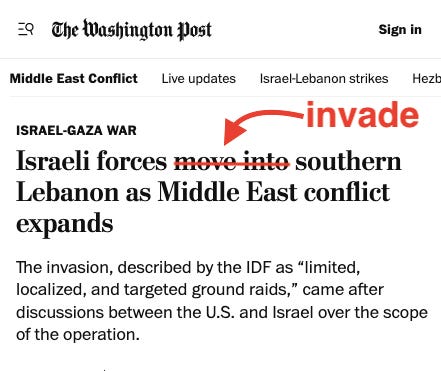
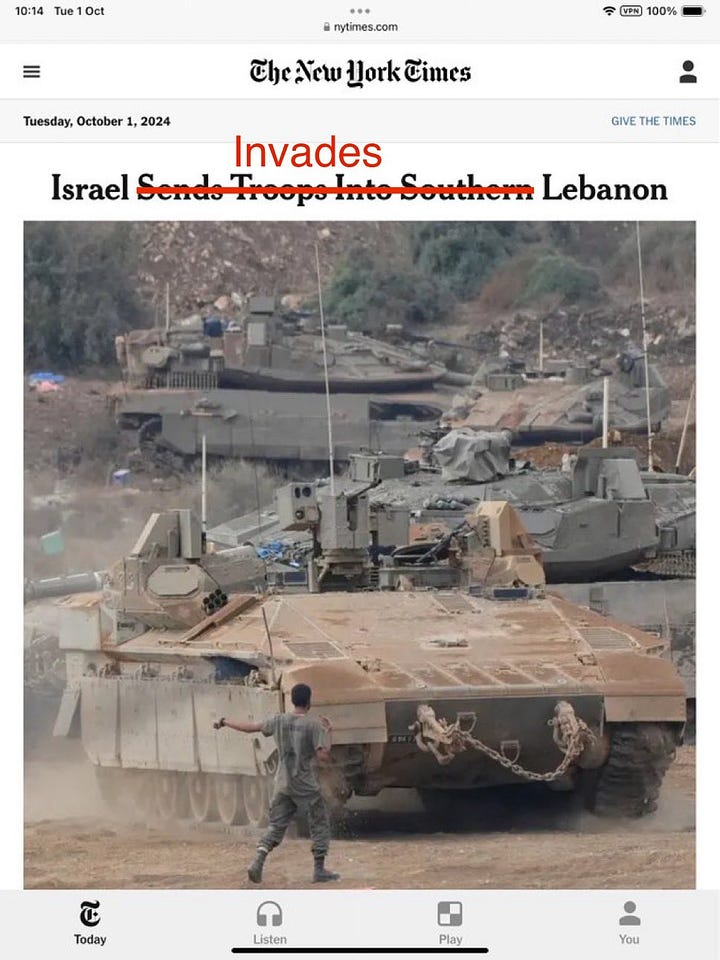




Serial Misfit
Serial Misfit
22 hrs agoLiked by Martin C. Fredricks IV
Most people have no idea that the countries of the Middle East were drawn on a map by the British and French after the collapse of the Ottoman Empire, in a way that it would guarantee future frictions among the populations. Frictions that they kindled in societies that were peaceful, multicultural and for the most part secular. They created radical Islamists to use as tools against peaceful Muslims, who were in their majority (according to British polls of the time) in favour of the creation of one country, "Greater Syria" that would encompass the Levante and would be multiethnic and multicultural. And then they promoted the cartoonish version of a violent deranged Muslim, through their movies and media, to manufacture consent for their bloody wars. How many people know that socialism, panarabism, and secularism was on the rise across the Middle East when the West murdered their leaders and installed puppets? Or that Hassan Nashrallah was a book worm, close friend of Norman Finkelstein and Noam Chomsky?
Disgust does not even begin to describe how I feel